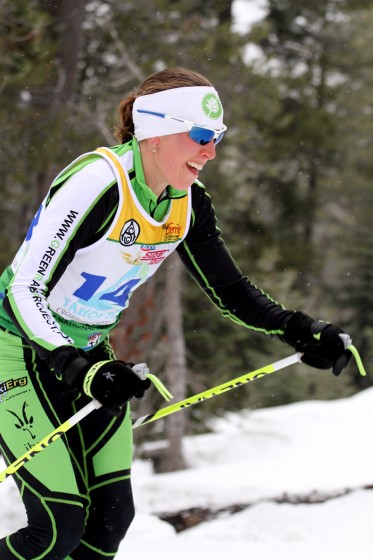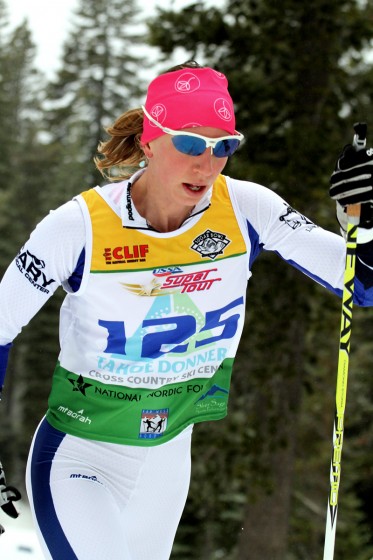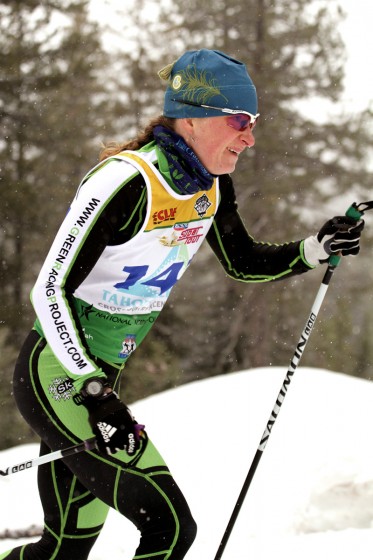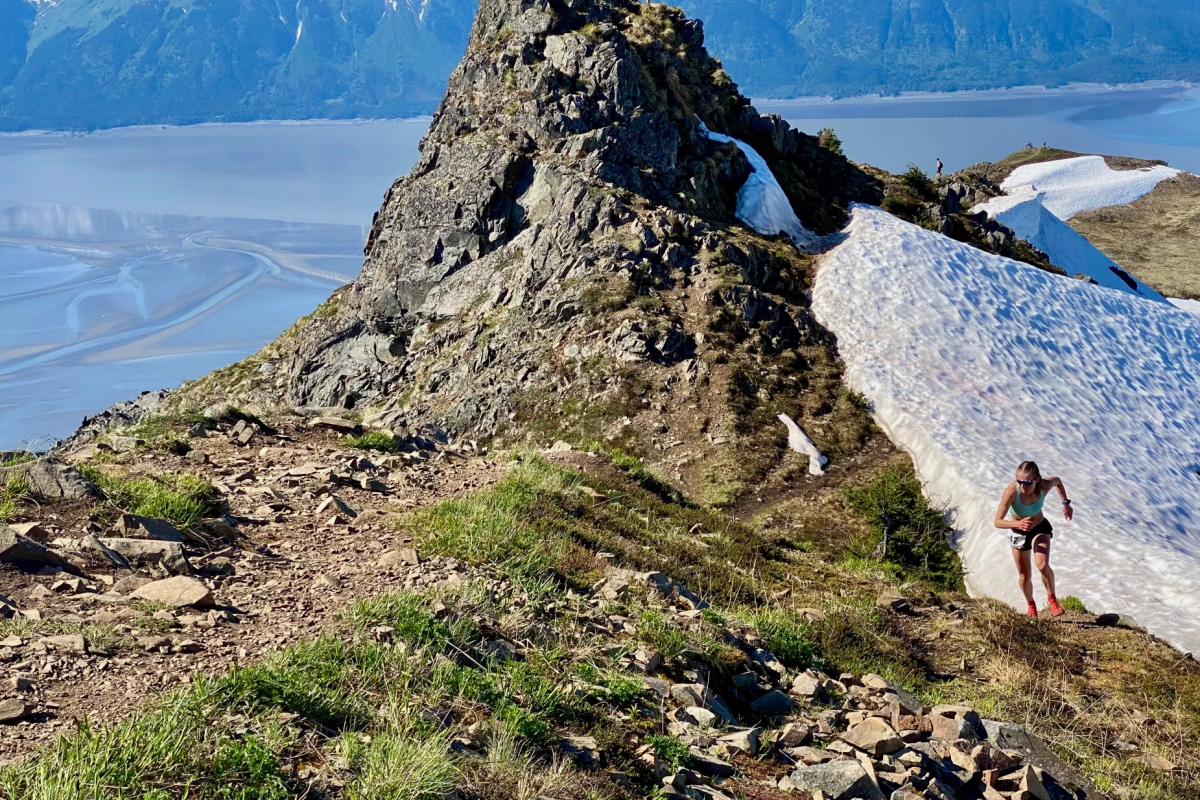
FasterSkier’s coverage of SuperTour Finals and U.S. Distance Nationals is brought to you by the generous support of Concept2, the leading manufacturer of indoor rowers, racing oars, and the SkiErg.
SODA SPRINGS, Calif. — After a long season of racing in Europe – one that could probably be considered the best-ever by a U.S. women’s team – biathletes Susan Dunklee, Annelies Cook, and Hannah Dreissigacker easily could have called it a year and headed home. Or, even better, somewhere warm.
That’s what their coach, Jonne Kahkonen, did, taking a vacation to the Caribbean. Tim Burke will head to the Bahamas; other teammates, too, will find beaches. Leif Nordgren was recently riding a bike along the California coast.
But the women apparently hadn’t had enough racing, and took a more exhausting route to California, turning up at SuperTour Finals – and turning heads.
Take Saturday, for example: Dunklee appeared in the final of the sprint, and Dreissigacker and Cook in the semifinal. They mixed it up in a serious way with members of the U.S. Ski Team, which is coming off its own best-ever season.
More surprising? The sprint was classic, a big change from biathlon, where all competitions feature skating.
“The biathletes did great,” Pepa Miloucheva, the Craftsbury Green Racing Project coach who works with Dunklee and Dreissigacker when they are home from Lake Placid and Europe, told FasterSkier. “Susan, not bad for a biathlete, A-final. These guys are awesome.”
But although the some members of the ski community might be wondering how the biathletes could beat them in a classic race, others aren’t surprised at all. Dunklee and Cook routinely turn in very fast ski times on the World Cup, and all three women were ski racers in college. Although they don’t show up regularly on the SuperTour circuit, they are far from unknown.
“Both Susan and Hannah are very good classic skiers,” Miloucheva said. “During their college years they did very good in classic also. They got a little bit tired today by the end because they haven’t done that much classic this year, but they’re awesome. They both did just great.”

Dunklee is leading the way so far for the biathletes, notching a fifth-place finish in the skate prologue and then finishing sixth in the sprint final. But Cook, who is representing the Maine Winter Sports Center, and Dreissigacker are more than holding their own, too: Cook placed ninth in the 10 k classic mass start and tenth in the sprint, and Dreissigacker was 11th in the 10 k and 12th in the sprint.
“I’m definitely sore,” Dunklee said after her first two classic races of the season. “We do a lot of classic training for recovery, just not intensity, so we’re still good classic skiers – I think! – but we’re just not used to going hard. We’re definitely getting those muscles worked.”
Much like the U.S. Ski Team women, this is the first time that the team is racing domestically this season. Dunklee and Cook have been on the World Cup since November, while Dreissigacker joined later after a few trials races here in the U.S.
“I think we want to be able to prove things with biathlon, but we also know if we tank, it’s okay because we’ve had a good season, a season we can be proud of and this is kind of an extra icing on the cake at the end,” Dunklee said.
The results add to a season where biathletes have repeatedly shown their strength alongside their skiing counterparts. Germany’s Miriam Gössner was just off the podium at cross country World Championships, finishing just a half-second out of bronze in the 10 k skate; in the same race, Finland’s Kaisa Makarainen placed 14th.
Canada’s Zina Kocher has also had strong results, heading to the Davos World Cup more or less on a whim, where she was the only Canadian women to start the 10 k skate. She finished 36th. Later in the season, she made an appearance at Canadian Nationals, where she was second in the 30 k, the top Canadian behind Switzerland’s Bettina Gruber.
None of the U.S. biathletes have won a race, of course, but that’s not the reason they came to California anyway.
“Truckee is a good place and we wanted to come out and reconnect with the nordic community,” Dunklee said. “This is a bunch of our friends that we don’t get to see very often, and they’re a really fun crowd and I miss it.”
All three were active in the ski community earlier in their careers, first as juniors and then in college. Dunklee and Dreissigacker raced for Dartmouth College and Cook for the University of Utah, and all were honored with All-American status at NCAAs. In fact, this is Dreissigacker’s first year as a full-time biathlete; before that, she raced cross country for the CGRP. Coming to SuperTour Finals is, for all of the women, very much rejoining their community.
And they come proudly, too. Dreissigacker qualified for her first World Championships this season, which came quickly after her switch to biathlon; Cook had a string of career-best results, including two top-20’s in Sochi, Russia. The best day of the season was likely when Dunklee finished seventh and Cook 14th in the 15 k individual at the future Olympic venue.
Along with Sara Studebaker, the women teamed up for tenth- and eleventh-place relay finishes late in the season.
“We have a great team right now,” Dreissigacker said. “I think our training plan is really good for continuity over the whole season. It’s a lot of training over the summer, and that’s good for keeping us still skiing fast at this time of the year. But I’m just psyched because I have great training partners, and it’s fun to be able to really compete with all the nordic girls, too, because they’re doing so well in the world.”

For Dreissigacker, attending these races instead of calling it quits on the season was important for some personal goals.
“I feel like I haven’t been skiing that fast this year, especially in biathlon races,” she said. “I was hoping to do well here just to prove to myself that my training was going all right and that I could ski fast. So I’m psyched about that. But other than that, it’s meant to just be an end-of-season fun sort of thing.”
And Dunklee viewed the sprint and Friday’s mass start as ways to tune up her head-to-head race strategies.
“We don’t get that many opportunities to practice pack skiing and mass starts, especially this year I didn’t qualify for any of the mass starts in the World Cup, which I was very disappointed in,” she explained. “But doing a mass start out here the other day and doing heats today, it was really good to keep in touch with that aspect of skiing. I think it’s really good training.”
For all, though, the focus was fun, and to end the season with happy memories and positive vibes. If they do well? Great. If not? Well, that’s okay too.
“It’s more just fun, to be honest,” Cook said after the sprint qualifier. “None of us have any expectations. The last time I sprinted, and the last time I did a classic race, was last year. So you go out there, and people are like, ‘how was it?’ And you say, ‘I don’t know!’ I went hard. I think my kick was OK.”
All three ended up in the same semifinal of the sprint, which was a treat. As Dunklee said, they don’t get to race against each other directly very often; mass start competitions on the World Cup only take 30 women, the number of points on a range, and no Americans qualified for any of the races this season.
Toeing the line together also added an exciting element to the competition the women are holding among themselves: who can ski the best in these final races.
“We have a pretty serious competition going here, between the three of us, it’s the Biathlon Cup,” Dunklee explained.
“It’s hard to tell who’s going to win, because it will really depend on the hill climb,” Dreissigacker said.
Laughing, Cook agreed: “Hannah and I are pretty neck and neck.”
So, as tired as they are, there’s more than just pride for their sport on the line, and the chance to show that biathletes are good skiers. When it comes time to skate up the Sugar Bowl, probably the most grueling format available in ski racing today, these three women will be fighting extra hard to beat each other. Dreissigacker suggested that the winner might be rewarded by the opportunity to buy the other two a beer.
Any one of the three might have a great climb. The last time they tried one was in the fall, when Climb to the Castle took place just outside their normal training grounds in Lake Placid; Cook and Dunklee sat it out, but Dreissigacker finished fourth behind U.S. Ski Team members Liz Stephen, Jessie Diggins, and Ida Sargent.
So what happens at the Sugar Bowl? It could be anything.
“It will all come down to the last day,” Dunklee said.
– Alex Matthews contributed reporting.
Chelsea Little
Chelsea Little is FasterSkier's Editor-At-Large. A former racer at Ford Sayre, Dartmouth College and the Craftsbury Green Racing Project, she is a PhD candidate in aquatic ecology in the @Altermatt_lab at Eawag, the Swiss Federal Institute of Aquatic Science and Technology in Zurich, Switzerland. You can follow her on twitter @ChelskiLittle.




One comment
nyctvt
April 7, 2013 at 9:09 am
Just needed Sara Studebaker to make the team complete!